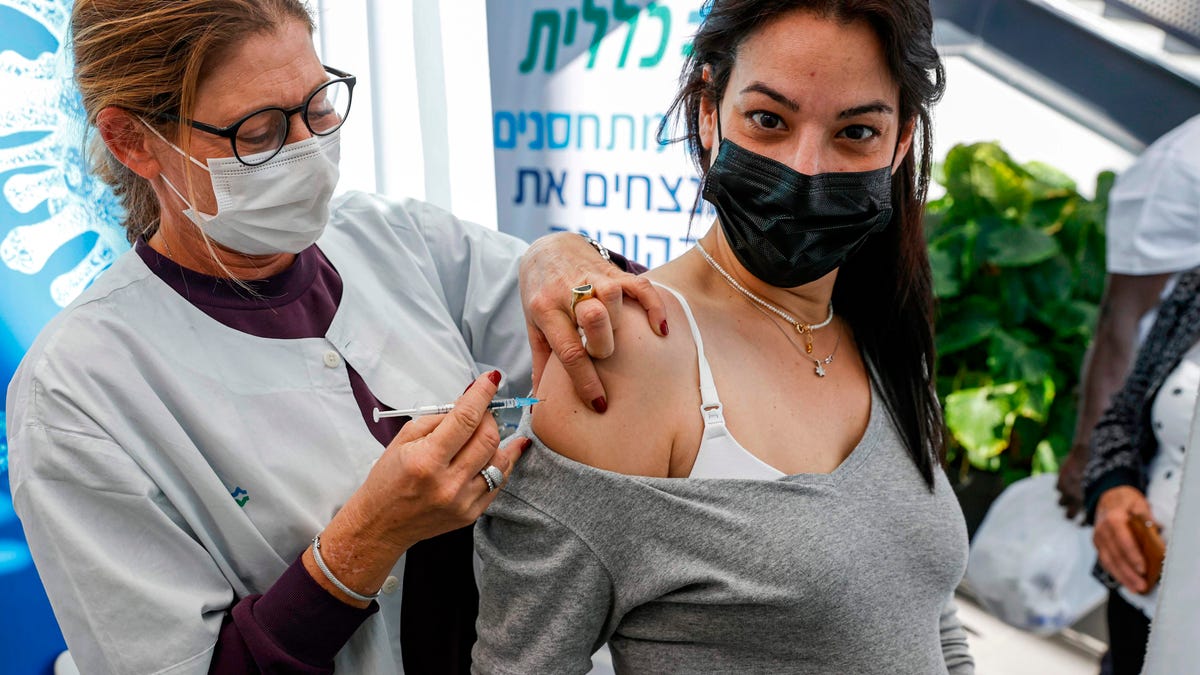Some pregnant women remain unsure about receiving the COVID-19 vaccine because safety data are scarce and health guidelines are vague and in some cases contradictory.
But dr. Anthony Fauci, the country’s leading expert in infectious diseases, said on Monday that about 10,000 pregnant women in the US had been vaccinated since the Food and Drug Administration approved two vaccines, and so far there have been ‘no red flags’.
“We vaccinated many pregnant women. The FDA has followed them and will continue to follow them, ‘he said at a news conference during the IAS COVID-19 conference: prevention. “Although we do not have good data on it, the data we have collected so far about it has no red flags.”
The Centers for Disease Control and Treatment says the mother should decide to get vaccinated in consultation with her healthcare provider. Fauci said Monday the agency is keeping up that recommendation.
The American College of Obstetricians and Gynecologists (ACOG) said COVID-19 vaccines approved by the U.S. Food and Drug Administration should be made available to pregnant women who choose to receive the vaccine.
But the World Health Organization updated the recommendations Friday that appear to contradict U.S. agencies and organizations. According to WHO guidelines, pregnant women should only be vaccinated if they are at high risk of exposure to the coronavirus, such as in health care, or if they have underlying medical conditions that put them at risk for serious diseases.
“We realize that the contradictory recommendation of the World Health Organization can be disturbing for many pregnant people who are currently struggling with the decision of whether to be vaccinated,” said Dr. Christopher Zahn, ACOG’s vice president of practice activities, said.
Zahn noted that even in the absence of safety data, early evidence from animal studies led experts to believe that there may be no harmful consequences for the reproduction of the fetus or the female.
In addition, mRNA vaccines, such as those made by Pfizer-BioNTech and Moderna, do not contain any live virus that could make anyone sick. The mRNA, genetic code that instructs cells to make the so-called spike protein that triggers an immune response, also does not enter the nucleus and can not cause any genetic changes.
“With that said, each person should make the best decision, in collaboration with their clinical care team, if possible, based on the information and data currently available,” Zahn said.
The reason there is little safety data is because pregnant women were excluded from Pfizer-BioNTech and Moderna vaccine trials. But although information on the vaccine is scarce, a handful of studies have shown the dangers of COVID-19 among pregnant women.
According to a CDC study published in November, pregnant women aged 35 to 44 years with COVID-19 were almost four times more likely to require invasive ventilation and twice as likely to die than non-pregnant women. of the same age.
A more recent study from the University of Utah Health also found that pregnant women who become seriously or critically ill with COVID-19 are at greater risk of dying and experience serious pregnancy complications compared to pregnant women who were asymptomatic or mild had symptoms.
Of the critically ill pregnant women, 50% of them underwent a caesarean section, 50% of their babies went to the neonatal intensive care unit (NICU), 42% gave birth less than 37 weeks early and 40% had a high had birth. blood pressure during pregnancy.
“This is another piece in the puzzle, as women weigh whether they want the vaccine during pregnancy, even though they do not have data,” says Dr. Torri Metz, lead author and a subspecialty of maternal fetal medicine and associate professor at the University of Utah Health.
The maternal mortality rate in the study was 0.3%, which is higher than the mortality rate for pregnant women without COVID-19, according to 17.4 deaths per 100,000 live births, according to the latest data from the CDC.
Lose to COVID-19, and then lose in the data: Federal officials, health equality researchers raise alarm over racial inequality, ethnicity information
Millions of people survive COVID: Their sense of smell and taste do not. Will they come back? Not even researchers know.
The study examined medical records of 1,219 pregnant women from 33 hospitals in 14 states from March 1 to July 31, 2020. These restrictions mean that there are no data on women in their first and second trimesters, as most mothers who were in their third trimester had to give birth by July.
Women’s health experts say pregnant women should have been included in vaccine trials from the beginning so they could make evidence-based decisions.
“The problem is that people are trying to protect pregnant women from research, and ultimately it is not benefiting pregnant people or their babies,” Metz said. “They really need to be included in the research from the beginning so that we have the necessary information to advise them.”
A Pfizer spokesman said the company would test the vaccine in pregnant women over the next few months, according to The New York Times. Moderna also plans to set up a registry to look for side effects in pregnant women, similar to the CDC and FDA.
One would think pregnant women would be reluctant to sign up for clinical trials, Metz said, but some are eager to participate.
“I receive numerous emails requesting opportunities for participation … they want to be part of these studies that will give us information about the vaccine and pregnancy,” she said. “The most important thing we can advocate for is to make it an option for patients from the beginning.”
Follow Adrianna Rodriguez on Twitter: @AdriannaUSAT.
Health and Patient Safety Coverage in USA TODAY is made possible in part by a grant from the Masimo Foundation for Ethics, Innovation and Competition in Healthcare. The Masimo Foundation does not provide editorial input.
